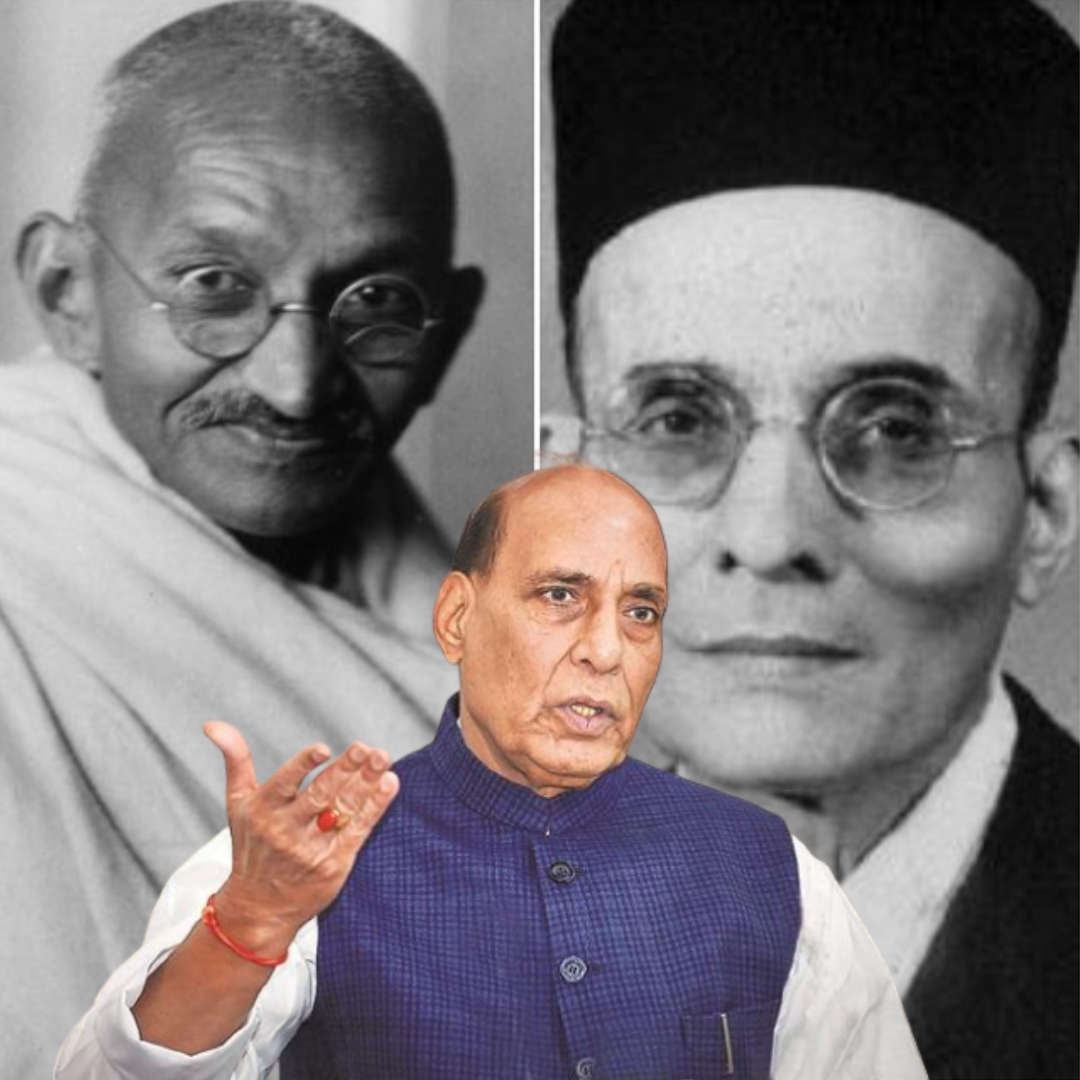
Image Credit: Wikipedia
Did Gandhi Suggest Savarkar To Write Mercy Petitions? No, Rajnath Singh Made False Claim
Writer: Jakir Hassan
A journalist at heart loves the in-depth work of reporting, writing, editing, research, and data analysis. A digital and social media enthusiast.
India, 14 Oct 2021 3:11 PM GMT
Editor : Bharat Nayak |
As the founding editor, Bharat had been heading the newsroom during the formation years of the organization and worked towards editorial policies, conceptualizing and designing campaign strategies and collaborations. He believes that through the use of digital media, one could engage the millennial's in rational conversations about pertinent social issues, provoking them to think and bring a behavioral change accordingly.
Creatives : Jakir Hassan
A journalist at heart loves the in-depth work of reporting, writing, editing, research, and data analysis. A digital and social media enthusiast.
Mahatma Gandhi was in South Africa when the first few mercy petitions were written by Veer Savarkar.
Defence Minister Rajnath Singh recently gave a statement on Savarkar which has created a buzz among Politicians and people on social media. He made a statement during the launch of a book based on the life of Savarkar, 'Veer Savarkar: The Man Who Could Have Prevented Partition', authored by Information Commissioner Uday Mahurkar and academic Chirayu Pandit. During the book launch event, Rajnath Singh described Savarkar as an "icon of Indian history", and he claimed that it was at the request of Mahatma Gandhi that Savarkar had filed a mercy petition to the British for his release. Right-wing website Swarajya while referencing Vikram Sampath's book on Savarkar, also supported Rajnath Singh's statement on Savarkar. Its headline reads, "Rajnath Singh Is Right; Gandhi Advised Savarkar Brothers To File Petition."
Know the History:
Savarkar was sentenced to two terms of 50 years on April 8, 1911, under the Nashik Conspiracy Case for the murder of Nashik District Collector AMT Jackson and was sent to Cellular Jail Port Blair. He was accused of providing the pistol used to kill Jackson. During the assassination, he was in London. His elder brother Ganesh Damodar Savarkar was also arrested in this case. He was kept in a small cell on the third floor of the Cellular Jail.
Savarkar filed a mercy petition on the advice of Mahatma Gandhi?
Cellular Jail detainees used to write petitions to the British officials. It was, in fact, an important legal right available to the prisoners.
When Savarkar was being brought to India by sea after arrest, he also tried to escape near the coast of France but was caught. In 1911, he was sentenced to black water. That is, he was put in the Cellular Jail of Andaman. For about ten years, Savarkar remained in the Andaman jail. He wrote letters five times for his release from jail. Savarkar filed five mercy petitions in 1911, 1913, 1914, 1918 and 1920. It is worth noting that Mahatma Gandhi was in South Africa between 1911 and 1914 when Savarkar wrote three mercy pleas. He only returned to India in 1915. So there is no question that Gandhi had advised him to write a mercy petition.
Gandhi demanded the release of Savarkar in 1920. Gandhi also wrote a letter to Savarkar's brother in 1920 on the petition for release. So to say that Savarkar filed the mercy petition at the behest of Gandhi would not be correct according to history.
In fact, it was Savarkar's younger brother Narayan Damodar Savarkar who first wrote a letter in which he sought help from Gandhi Ji for his brother's release. The Narayan Savarkar letter which he wrote to Gandhi in 1920 reads, "I was informed by the Government of India that the Savarkar brothers were not included in those that are to be released....it is now clear that the Indian Government have decided not to release them. Please let me hear from you as to how to proceed in such circumstances...They (my brothers) have already undergone a rigorous sentence for more than ten years in the Andamans, and their health is utterly shattered. Their weight has come down from 118 to 95-100." This letter can be read in the Collected work of Mahatma Gandhi Volume 19 (Page 348).
While replying to the letter of Narayan Damodar Savarkar on January 25 1920, Gandhi wrote, "I have your letter. It is difficult to advise you. I suggest, however, your framing a brief petition setting forth the facts of the case bringing out in clear relief the fact that the offence committed by your brother was purely political. I suggest this in order that it would be possible to concentrate public attention on the case. Meanwhile, as I have said to you in an earlier letter, I am moving in the matter in my own way." Here, Gandhi can be clearly seen advising Narayan Savarkar to write a mercy petition only after he asked for the suggestion.
Two months later, Savarkar again wrote a mercy petition dated March 30, 1920, in which he concluded: "I and my brother are perfectly willing to give a pledge of not participating in politics for a definite and reasonable period that the Government would indicate...This or any pledge, e.g., of remaining in a particular province or reporting our movements to the police for a definite period after our release - any such reasonable conditions meant genuinely to ensure the safety of the State would be gladly accepted by me and my brother."
Famous Historian Irfan Habib, while talking to NDTV, also nullified this claim and said Gandhi advised Narayan Savarkar to write a mercy petition after he got a letter from him first. Later, Mahatma Gandhi wrote a letter to the British Government which he later also published in his weekly journal "Young Indian" as well on May 26 1920, which reads, "Thanks to the action of the Government of India and the Provincial Governments, many of those who were undergoing imprisonment at the time have received the benefit of the Royal clemency. But there are some notable" political offenders" who have not yet been discharged. Among these, I count the Savarkar brothers. They are political offenders in the same sense as men, for instance, who have been discharged in Punjab. And yet these two brothers have not received their liberty although five months have gone by after the publication of the Proclamation." This letter can be accessed in Mahatma Gandhi collected works volume 20.
[In the English and British tradition, the royal prerogative of mercy or Royal clemency is one of the historic royal prerogatives of the British monarch, by which he or she can grant pardons to convicted persons.]
The letter further reads, "Both these brothers have declared their political opinions, and both have stated that they do not entertain any revolutionary ideas and that if they were set free, they would like to work under the Reforms Act.....On the contrary, they feel that India's destiny can be best worked out in association with the British...I hold therefore that unless there is absolute proof that the discharge of the two brothers who have already suffered long enough terms of imprisonment."
The Congress party took no time to dig at Rajnath Singh comment and criticised him for his comment on Veer Savarkar. Congress MP Jairam Ramesh, while criticising Rajnath Singh, wrote a caption that reads, "Rajnath Singh-ji is amongst the few sober & dignified voices in Modi Sarkar. But he doesn't seem to be free of the RSS habit of rewriting history. He has given a twist to what Gandhi wrote on January 25 1920. Here is that letter to Savarkar's brother."
Member of Parliament (MP) from Hyderabad and All India Majlis-e-Ittehadul Muslimeen (AIMIM) chief Asaduddin Owaisi slammed the Union Minister stating that the claim is a move to distort history.
Our investigation shows that Mahatma Gandhi was in South Africa when Veer Savarkar wrote the first three mercy petitions. Also, there is no evidence that proves that Savarkar wrote a mercy petition after Gandhi's advice. Hence, the claim made by Rajnath Singh is false.
If you have any news that you believe needs to be fact-checked, please email us at factcheck@thelogicalindian.com or WhatsApp at 6364000343.
Also Read: Delhi Government Requested Residents To Donate Coal? No, Image Is Morphed!
 All section
All section














